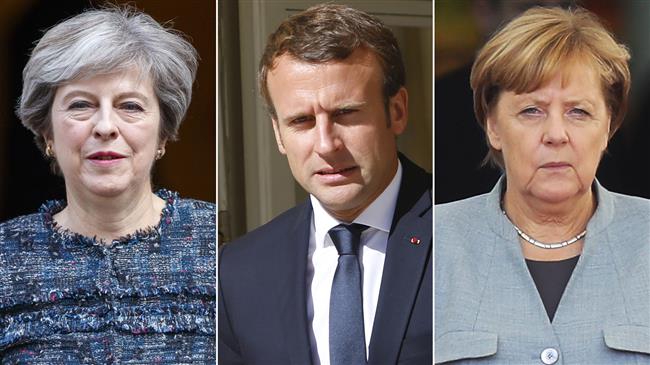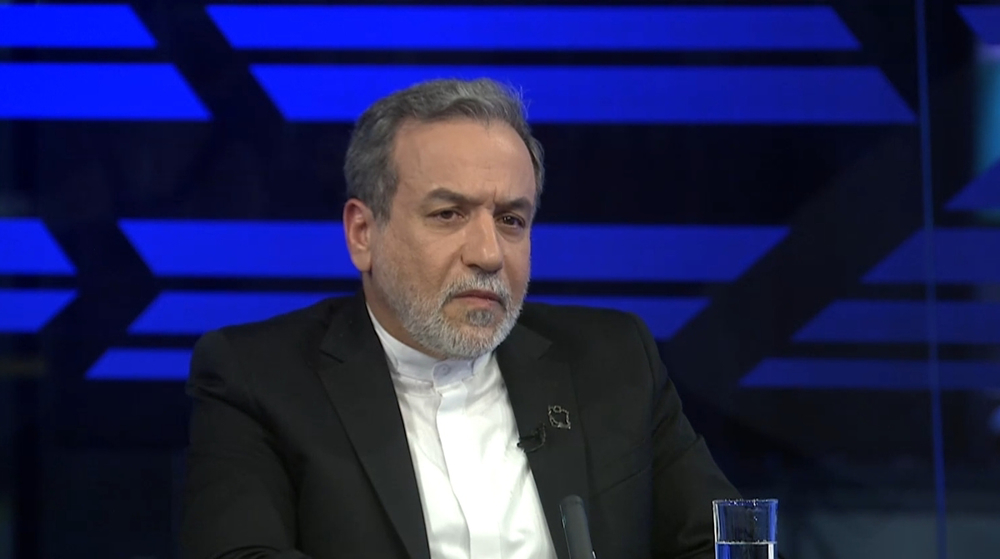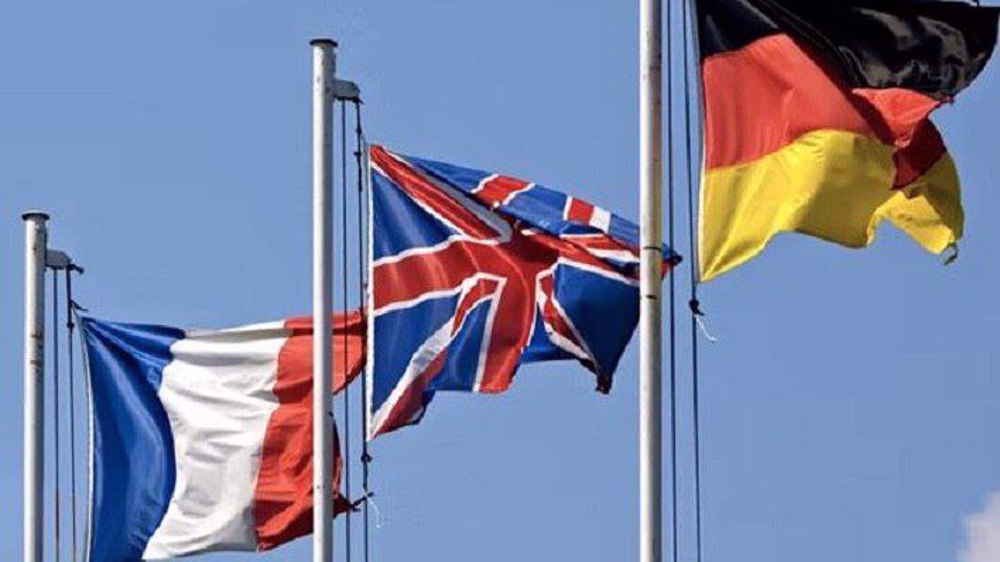Britain, France and Germany reiterate support for Iran nuclear deal
The leaders of Britain, France and Germany have reaffirmed their support for the landmark nuclear deal with Iran, noting that it is the best way to keep limitations on Iran's nuclear program in place.
According to a statement by the office of Britain's Prime Minister Theresa May on Sunday, French President Emmanuel Macron and German Chancellor Angela Merkel made the remark in separate phone calls with the British premier as a May 12 deadline looms for US President Donald Trump to decide on whether to reestablish sanctions against Tehran.
Trump is a stern critic of the nuclear deal reached between Iran and the five permanent members of the UN Security Council -- the United States, France, Britain, China, and Russia -- plus Germany. Under the agreement, nuclear-related sanctions put in place against Iran were lifted in exchange for curbs on Tehran's nuclear program.
The US president on January 12 reluctantly agreed to waive sanctions against Iran that were lifted as part of the landmark deal, but threatened to withdraw from the accord if some "disastrous flaws" were not fixed.
He said he wanted America's European allies to use the 120-day period before sanctions relief again came up for renewal to agree to tougher measures and new conditions; otherwise Washington would pull out of the deal.
The three European leaders, however, said the JCPOA might need to be broadened to cover other issues such as Iran's missile program.
"They committed to continue working closely together and with the US on how to tackle the range of challenges that Iran poses – including those issues that a new deal might cover," the statement said.
The latest allegation by European leaders came as Iran has repeatedly warned that any failure to respect the multinational agreement would have grave consequences, stressing that there is no alternative to the nuclear accord.
Iranian President Hassan Rouhani on April 24 warned the United States against violating the nuclear accord, saying any failure to respect the multinational agreement would entail “grave consequences.”
“Today, we are standing by our commitments stronger than ever before. However, anyone seeking to betray their commitments to us should know that the grave consequences of such a move will affect them,” he said.
Iran's Foreign Minister Mohammad Javad Zarif also said on April 23 that European signatories to the multilateral nuclear agreement should convince the US president not to pull out of the deal, because there is no "Plan B" for it.
"It's either all or nothing. European leaders should encourage President Trump not just to stay in the nuclear deal, but more importantly to begin implementing his part of the bargain in good faith," Zarif said in a post on his official Twitter account.
A spokeswoman for Chinese Foreign Ministry, Hua Chunying, on Friday expressed Beijing's support for the nuclear agreement and said her country would continue to uphold and implement it.
"The Joint Comprehensive Plan of Action on the Iran nuclear program is a multilateral agreement reached by six countries, European Union and Iran after negotiations. It has also been endorsed by the United Nations Security Council in Resolution 2231," Hua said at a press briefing.
Read more:
- EU foreign ministers fail to agree on new sanctions against Iran
- Iran's response readiness will startle US if it pulls out of JCPOA: Salehi
- Keeping Iran nuclear deal in place vital for EU: Mogherini
- Following suit with US on nuclear deal humiliating for Europe: Salehi
No Trump decision yet on JCPOA: Pompeo
Meanwhile, new US Secretary of State Mike Pompeo said that President Trump had not yet taken any decision on whether to exit the Iran nuclear deal, though he was not likely to keep it without "substantial" changes.
Speaking at a news conference on Friday after a NATO meeting of foreign ministers, Pompeo added that the US administration was "unlikely to stay in that deal past this May" without a modification of the agreement.

"You asked if we talked about the decision (on the Iran nuclear deal). There has been no decision made so the team is working and I'm sure we'll have lots of conversations to deliver what the (US) president has made clear," he said.
US president made no decision on Iran nuclear deal: Bolton
US National Security Advisor John Bolton also said on Sunday that the US president had not yet decided whether or not to scrap the Iran nuclear deal.
"He has made no decision on the nuclear deal, whether to stay in or get out," Bolton told Fox News.
"He is certainly considering the framework, the four pillars that President Macron laid out in their meeting last week," added Bolton, referring to efforts to supplement the Iran deal with additional measures to make it more palatable to Trump.
Speaking at the US Congress Wednesday on the final day of a three-day state visit to Washington, Macron said Paris would not leave the Iran nuclear deal.
The French president added that the JCPOA was not addressing what he called “all concerns,” but stressed that the deal could not be ditched.
UNRWA will ‘stay, deliver’ aid to Palestinians despite Israel’s ban: Lazzarini
Explainer: What makes Iran's Rezvan and Raad loitering munitions prized assets?
VIDEO | Unseen agony: Missing loved ones of genocide in Gaza
Iran cuts gold import tariff to zero
Pezeshkian: Iran determined to develop, boost ties with neighbors
VIDEO | Israel, Hamas ceasefire agreement: Closer than ever
VIDEO | Gaza ceasefire to be put in place under resistance conditions
Hot water and sewage: Palestinians share harrowing tales of torture in Israeli prisons














 This makes it easy to access the Press TV website
This makes it easy to access the Press TV website